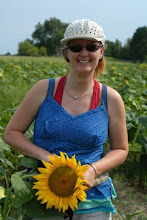Community Seed Swap & Guidelines
Bring your home-saved seeds (or surplus purchased seeds) to share with others, pick up some seeds for spring planting, learn how to clean seeds, and get tips on starting plants from seed for next year's garden. Cost: $5.00 donation, or free if you bring seeds to share! See below for guidelines if you plan to bring seeds to share. Contact Chrys Gardener at cab69@cornell.edu if you have any other questions.Seed Swapping Guidelines
- It's ideal if you can pre-package small seeds in individual envelopes. Sometimes with small seeds, people don't realize how much they are taking. By pre-packaging there will be more to go around. Write the name of the variety and the year collected on the envelopes. Large seeds (corn, beans, etc) can be loose for people to package themselves.- People will have questions about the varieties you are swapping - how tall does it get, how many days till harvest, what's the flavor like, etc. Know your varieties, and if you want to save yourself from repeating the same information you can make an index card with information for each of the varieties you are swapping.
Home-Saved Seed
- Be sure that you saved seeds from plants that were open-pollinated varieties, not hybrids, otherwise they will not come 'true-to-seed' for the next person that grows them. If you bought the plants from a garden center, the tag may say if it's a hybrid. If you started the plants from seed yourself the seed packet will say either open-pollinated or hybrid- Some vegetables will cross-pollinate with other related plants, for example many types of winter and summer squash can cross producing sometimes inedible results in the next generation. Some plants are self-pollinated and are easy to save 'true' seed from without any isolation techniques - tomatoes, lettuce, peas, and beans are all generally considered 'fool-proof'. If you saved seeds from other types of vegetables without avoiding the possibility of cross pollination, just state that on the seed packets (eg. 'Possibly crossed with other squash').
Purchased Seed
- If you have extra quantities of purchased seed that you want to swap, you can bring both open-pollinated and hybrid varieties. Just make sure they are clearly labeled as such so that people who want to save seeds from them know which is which.- See more at: http://ccetompkins.org/calendar/13/11/06/community-seed-swap-guidelines#sthash.uIGajFUy.dpuf
Community Seed Swap
Bring your home-saved seeds (or surplus purchased seeds) to share with others, pick up some seeds for spring planting, learn how to clean seeds, and get tips on starting plants from seed for next year's garden. Cost: $5.00 donation, or free if you bring seeds to share! See below for guidelines if you plan to bring seeds to share. Contact Chrys Gardener at cab69@cornell.edu if you have any other questions.
It's ideal if you can pre-package small seeds in individual envelopes. Sometimes with small seeds, people don't realize how much they are taking. By pre-packaging there will be more to go around. Write the name of the variety and the year collected on the envelopes. Large seeds (corn, beans, etc) can be loose for people to package themselves.
See more at: http://ccetompkins.org/calendar/13/11/06/community-seed-swap-guidelines#sthash.uIGajFUy.dpuf







No comments:
Post a Comment